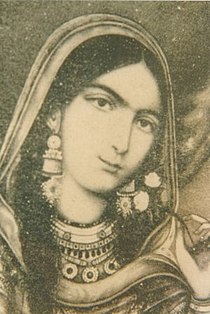Begum Hazrat Mahal
| Begum Hazrat Mahal | |
|---|---|
| Begum of Awadh | |

Begum Hazrat Mahal
|
|
| Born | c. 1820 Faizabad, Awadh, India |
| Died | 7 April 1879 (aged 59) Kathmandu, Nepal |
| Husband | Wajid Ali Shah |
| Religion | Islam |
Begum Hazrat Mahal (Urdu: بیگم حضرت محل; c. 1820 – 7 April 1879), also known as Begum of Awadh, (OUDH) was the first wife of Nawab Wajid Ali Shah. She rebelled against the British East India Company during the Indian Rebellion of 1857. After her husband had been exiled to Calcutta, she took charge of the affairs in the state of Awadh and seized control of Lucknow. She also arranged for her son, Prince Birjis Qadra, to become Wali (ruler) of Awadh; However, he was forced to abandon this role after a short reign. She finally found asylum in Nepal where she died in 1879.
Mahal's maiden name was Muhammadi Khanum, and she was born at Faizabad, Awadh, India. She was a courtesan by profession and had been taken into the royal harem as a khawasin after being sold by her parents. She was then sold to Royal agents, and later promoted to a pari, and was known as Template:Mahak Pari. She became a begum after being accepted as a royal concubine of the King of Oudh, and the title 'Hazrat Mahal' was bestowed on her after the birth of their son, Birjis Qadra.
She was a junior wife of the last Tajdaar-e-Awadh, Wajid Ali Shah. The British had annexed Oudh in 1856 and Wajid Ali Shah was exiled to Calcutta. After her husband was exiled to Calcutta, she took charge of the affairs of the state of Awadh despite her divorce from the Nawab, which then was a large part of the current state of Uttar Pradesh, India.
During the First War of Independence, from 1857 to 1858, Begum Hazrat Mahal's band of supporters, led by Raja Jailal Singh, rebelled against the forces of the British East India Company; later, they seized control of Lucknow and she declared her son, Birjis Qadra, as the ruler (Wali) of Oudh. When the forces under the command of the British re-captured Lucknow and most of Oudh, she was forced to retreat. Hazrat Mahal worked in association with Nana Saheb, but later joined the Maulavi of Faizabad in the attack on Shahjahanpur.
...
Wikipedia
